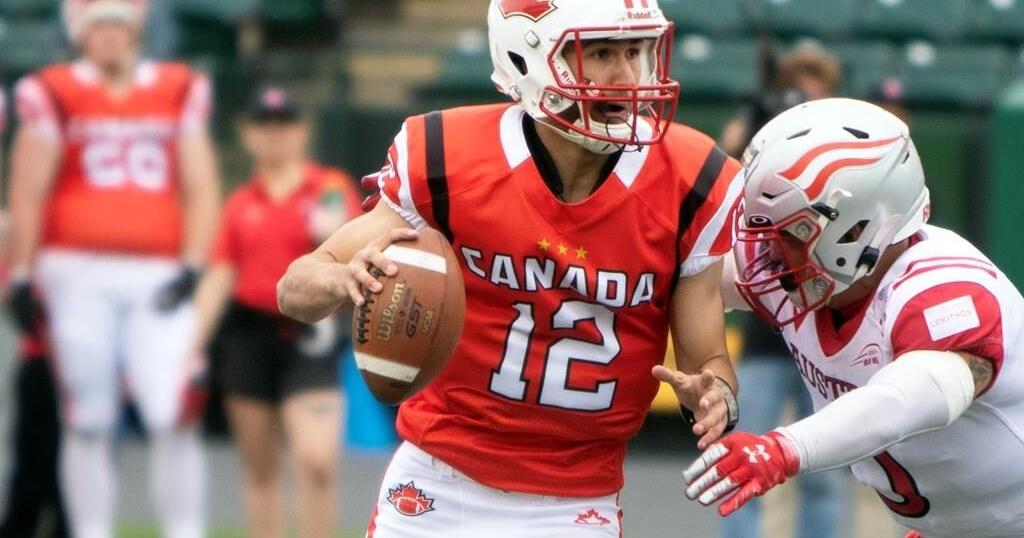It’s been a whirlwind of late for Pepe Gonzalez.
The 19-year-old quarterback is preparing for his third football game in eight days but the biggest one of his young career. On Sunday, Gonzalez and Canada 1 meet Japan in the International Federation of American Football (IFAF) world junior final in Edmonton.
“It’s crazy because everything seems to go so fast,” Gonzalez said. “One day you’re watching tape of Austria, the next day you’re watching tape of Japan and you really don’t have time to rest or anything.
“But it’s part of the game, it’s part of the tournament and it’s really exciting to be honest. Not stopping to think about anything but football is something I love.”
Canada 1 opened the eight-team tournament with a lopsided 110-0 win over Brazil on June 22. But the squad had to rally for a 27-20 semifinal win over Austria on Wednesday.
Japan defeated Australia 50-6 in its first game. Then it earned its first-ever final berth with a 41-20 semifinal win over the U.S.
This country’s second entry, Canada 2, lost a 41-13 decision to Austria before earning a 63-7 win over Brazil. The team, led by former McGill head coach Ron Hilaire, faces Australia on Sunday to determine fifth and sixth place.
Canada 1 is looking to secure the country its third straight gold medal in this event, which is being held following a six-year absence due to the global pandemic. Canada has captured three gold and two silver medals since the tournament’s inception in 2008.
A fact not lost upon Gonzalez, of Vaudreuil-Dorion, Que., whose team is also shouldering the weight of expectation on home soil.
“I try not to think about it,” Gonzalez said. “I really don’t feel there’s pressure even though there is.
“It’s something I keep within because I trust the coaches, trust my O-line, my teammates and that everything will be aligned so we can have a terrific game.”
The six-foot-two, 185-pound Gonzalez was 10-of-19 passing for 126 yards with two TDs and an interception versus Austria. He also ran five times for 25 yards as Canada 1 overcame a 17-10 halftime deficit.
After opening the second half with an interception, Gonzalez pulled Canada 1 into a 17-17 tie with an 11-yard TD strike to Nathan Carignan later in the third quarter.
“There’s such poise there, he’s so calm even under pressure,” Canadian 1 head coach Warren Craney said of Gonzalez. “He’s not in your face … but he has this swagger about him.
“We came into the second half, we needed to score and we threw that interception. But we stopped them on defence, forced a punt and Pepe got the ball back and we went all the way down the field. It was incredible.”
Craney said Japan will be a formidable opponent for Canada 1.
“They’re good and very fast,” he said. “The only thing they were ever missing was size on the line and they’ve found it.
“That being said, we think we match up better with Japan than we did with Austria, which was big and strong. So are we but they played a physical game and we think we’re built more like Japan, we feel we’re more of a finesse team.”
Gonzalez and Craney believe the adversity Canada 1 faced against Austria should serve it well Sunday.
“It’s a good thing because you realize everybody in this tournament is good and is working just as hard as you are,” Gonzalez said. “Having been involved in a close semifinal is perfect for us because we know if we face the same adversity in the final, we’re going to be more prepared for that situation at that time.
“We’re very well coached, we have good athletes in this program and, so, absolutely we’re ready for any adversity.”
Craney wouldn’t be surprised if Gonzalez has a breakout championship game.
“He hasn’t played his best game yet,” Craney said. “Hopefully he’s saving that for Japan so we’re excited about that.”
A gold-medal effort certainly wouldn’t hurt Gonzalez’s goal of playing in the NCAA in 2025. And while he’s being recruited by American schools, Gonzalez wouldn’t be opposed to playing university football in Canada.
“Obviously it (world junior event) helps a lot with visibility,” he said. “It’s always been a goal for me to go to the NCAA but I think we’ve proven that football in Canada deserves its place.
“We have very good football here and also very good schools. But I’m really exploring all of my options because you only get recruited once in your life so I’m kind of enjoying the moment right now.”
This report by The Canadian Press was first published June 29, 2024.
